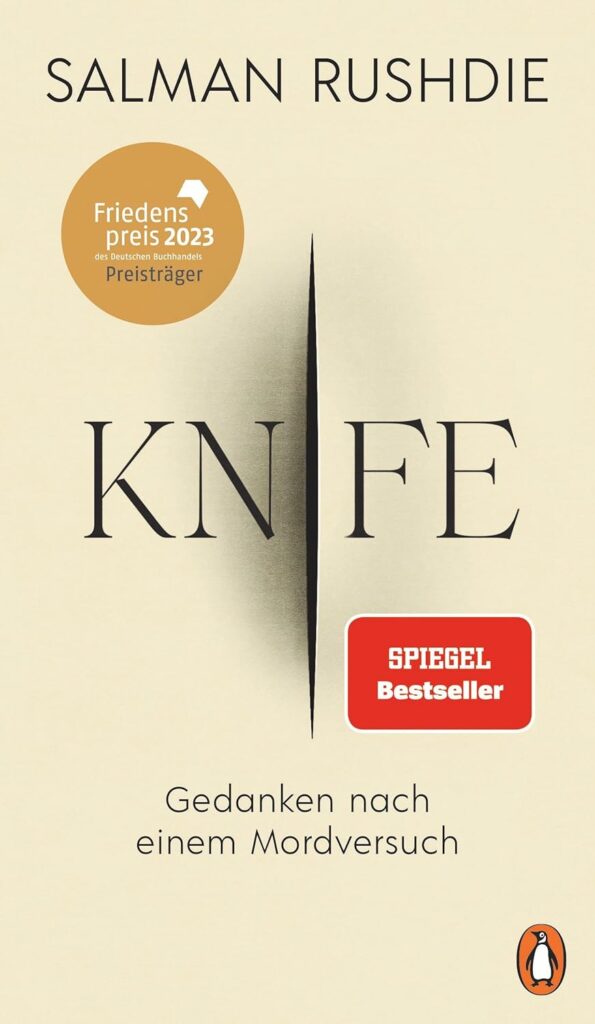Based on real events, Salman Rushdie’s book Knife focuses on his stabbing by an assailant named A. The narrative explores Rushdie’s physical condition and the trauma he suffers, highlighting his struggle to overcome these challenges with the love and support of those closest to him.
By Abdullah Talha Furkan Öztürk
Imagine a fiction writer, who uses the beauty of magic realism to critically analyze different beliefs and cultures, is writing a non-fiction book as his latest work of art. There must have been a radical change in his life. This imagined writer is, in fact, real. His name is Salman Rushdie, an Indian British writer who is now a US citizen, and his latest book is called Knife, both in a literal and figurative sense.
Rushdie gives his book the title Knife because »the nature of the story [he is] here to tell, is that it is a story in which hatred – the knife as a metaphor of hate – is answered, and finally overcome, by love«. In his book, Rushdie illustrates how love contrasts with hate by sharing how he overcame the trauma of a knife attack and the associated feelings of hate through the loving support of his wife, Eliza. Knife is a brilliantly written first-person autobiography with the metaphor of what it means for Rushdie to live between love and hate. With many emotional twists and explicit visual descriptions, he portrays his own reality to his readers. This opening up of his real life helps his readers understand him more than ever. Through a variety of quotations from different genres and books, he reveals not only who he is but also what literature means to him. Through the influence of many writers from various nations, he highlights the shared reality of writers facing diverse challenges in their lives, allowing him to evoke sympathy from different perspectives.
A Plot Like No Other
His readers have never really been confronted with the profound question of who he really is. In this sense, as Rushdie says, »many writers have been aware of a divide between their public and private selves« and until they open themselves up to who they are, they remain that way. However, the traumatic experience of the knife attack on August 12, 2022 by »the A.« has challenged Rushdie to reveal more of himself by demolishing the divide between his public and private image, in order to heal the scar made by Knife. Because the traumas are resolved only when they are shared, he opens himself up to his readers.
In Knife, Rushdie tells his readers how he experienced a traumatic scene at the Chautauqua Amphitheater, where he is attacked just as he is about to deliver a lecture for the Chautauqua Institution’s annual summer series. In that knife attack, he loses his right eye and also almost misses the vision in his life in the Chautauqua amphitheater. In the light of reality, with the fear of going completely blind, he poured out as blood the story of what had gone through his mind. This is very unusual of him since he is a fictional writer who focuses on the third person and does not want to share his private life and opinions. So, in an autobiographical way, he writes his testimony of how he felt and received this attack in the first person. He, then, positions his view on all this, while sharing with his readers his love story with Eliza, who has taken care of him by being with him in his most difficult moments.
A Love Story?
Knife is a story about how Rushdie achieves happiness in a rather unlikely course of life. He first argues that »happiness is a lie« until he meets Eliza, so it is only after »meeting with Eliza, [he] became happy«. Eliza and Rushdie represent an image of »total mutual support«, which to him means happiness. This happiness is private because it seeks no attention, their relationship is »out of the public eye« until his right eye is pierced by the A.’s knife. After the attack, in order to face his fears, Rushdie takes his writing more seriously than ever. With this serious attitude, he writes about things he loves while wishing for recovery. He is still healing, though he also knows that some things will not go away, like his lost eyesight.
Consequently, Rushdie shifts his emotional state from desiring to meet with his failed killer to wishing to have a normal life. This transformation occurs gradually during his healing process. As he recovers, he forgives his attacker more and more, allowing him to slowly return to his normal life. He had to take security precautions for a long time to hide from paparazzi or against death threats due to the fatwa issued by the Iranian regime after the publication of his critically acclaimed but controversial book The Satanic Verses (1988), which sparked protests among fundamentalist Muslims. In Knife he ponders his identity as »an atheist all my days, an atheist’s son and the father of two more atheists«, while also answering the question of who he is in his imagined dialogue with his attacker, saying, »I know I am not that second self [(the fake self)]. I am myself, and I turn away from hatred, and toward love«.
After the knife attack, he just wants to live his casual New York life without being torn between London and New York while stitching up his past scars. He does not want to deal with people’s problems anymore, not even with his family’s difficulties in London. He feels that what he needs now is a basic calm life with his loved ones. He longs to spend his remaining days with Eliza while writing. As a result, the change in his writing style is a sharp cut as if a real knife is ripping through his book. He has to talk about himself, what he loves, his values, what kind of beauty he seeks, instead of writing about other people’s stories and conflicts. This is his healing process. It is a serious revival when he blurs the line between his reality and the fictional life he has imagined. This is eminent when his readers ask him whether Victory City (his book published in 2023 just before the publication of Knife) »was written or rewritten, after the August 12 attack«, and he clearly states that »it wasn’t«.

Knife
Penguin: 2024
256 pages, 25 €
Healing and Belonging
Due to his story of migration, Rushdie has felt a sense of exile for a long time, and despite the protection he received, fear once surrounded him because of his enemies and those who viewed him as a foreigner. Now, however, he is enveloped in love, thanks to the friendships he has formed along the way. Especially after the attack, his loved ones gather around him, turning it into a kind of family reunion. He realizes how he is loved by many, and it is healthier for him to focus on his loved ones instead of those who hate him in the end. He says he returns »home«, where his heart truly lies. For him, this home is Eliza, his bookshelves, and his workplace.
In the end, Rushdie returns to the Chautauqua amphitheater with Eliza, revisiting the space where he was stabbed. It’s an intimate moment in which the past and the present, hate and love, exist at the same time. With this return, he changes his negative recollection of a traumatic event of the knife attack into a new positive memory of a bright and »blue-sky day« together with Eliza. He replaces his hatred of the person who attacked him with his love and gratitude for his wife. There at the Chautauqua, Rushdie and Eliza express their love and support for each other: «It is okay. It is good that we came. We are together. I love you. I love you too. This was important to do». Rushdie’s book starts with »I was attacked and almost killed by a young man with a knife«, but it ends with the intimacy between Eliza and Rushdie.






